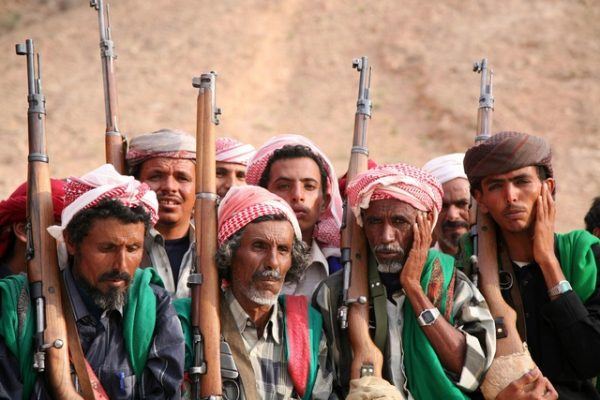“Yemen isn’t the end of the earth, but you can see it from there.” That was the first description I heard of it from a grizzled old diplomat when I learned I was assigned there. With the latest civil war and all the human suffering it is causing, Yemen looks as much like the end of the world as the end of the earth. Over 10,000 civilians have been killed, millions have been evicted from their homes, and hundreds of thousands are suffering starvation and disease.
Saleh once said that ruling Yemen was “like dancing on the heads of snakes.”
The death of Ali Abdullah Saleh, president of Yemen for over 30 years, comes as a great shock. Saleh once said that ruling the country was “like dancing on the heads of snakes.” Saleh was killed by the Houthi rebels, the northern tribesmen who overran northern Yemen in 2014. The Houthis have been allied with Iran, much to the alarm of the surrounding countries of the Gulf Cooperation Council, the GCC. Saleh also had been allied with them, but two days ago he announced that he was willing to break with the Houthis and abandon the rebellion, if the GCC would lift their blockade.
The Houthis said Saleh had betrayed them, and charged him with staging a coup against the rebellion. They overwhelmed his neighborhood south of the capital, Sanaa, and attacked his home with explosive artillery. He was killed earlier today in a mass explosion followed by an infantry attack.
Long History of Betrayals and Changing Sides
Saleh had a long record of changing sides to remain in power. He was the most committed backer of Saddam Hussein during the Iraqi invasion of Kuwait. His support cost Yemen dearly, as Saudi Arabia revoked the privileged work permits Yemenis had held, effectively expelling over a million guest workers. After the September 11th attacks, the Iraq War, and the removal of Saddam Hussein, Saleh tried to cozy up to the United States. During the Obama Administration, he allowed U.S. drone strikes on Yemeni territory against Al Qaeda in the Arabian Peninsula.
It all began with the Arab Spring.
It all began when the Arab Spring reached Yemen in 2011-2012. Protesters had occupied the streets of the capital, Sanaa, and other major cities for several months, calling for an end to Saleh’s rule and his financial and political corruption. Regional powers and the U.S. eventually stepped in and brokered a deal. Neither President Saleh nor the members of his family would be prosecuted for corruption or any excesses committed by forces under his command. In exchange, he would step down and allow his long-time vice president, Abd-Rabbu Mansour Hadi, to lead the country.
Many Yemenis protested the arrangement. They felt betrayed by Saleh, and by the regional allies and the U.S. for allowing him to resign with impunity. The nations of the world defended their action, saying they were attempting to avoid the brutality and bloodshed of another Yemeni civil war.
The Houthis of Saada
Saleh did not abide by the deal, however. After he resigned, he went to his ancestral lands in the north, and made an alliance with the fierce, heavily armed Houthi tribesmen in Saada. When I lived in Yemen in the early 1990s, Saada was off-limits to American diplomats. It was known as completely lawless, independent of the central government.

Saada was also famous for its arms souk, where a customer could buy any kind of dated East-bloc weaponry. This included RPG’s, anti-tank weapons, mortars, howitzers, and all the ammunition for them. Reports came in that a determined purchaser could even find old battle tanks. This was the home of the Houthis.
Saudi Arabia and the United Arab Emirates have led GCC efforts to back the internationally recognized government of Yemen. As a result, Yemen became the battleground for a proxy war between Iran and Saudi Arabia. Saleh was allied with the Houthis for several years. The military units he still commanded were key to many Houthi victories. But the GCC countries had an ace up their sleeve, which they played last month to divide the rebel coalition.
May Shorten the War in Yemen
Al Jazira reports that Saleh’s son, Ahmed, has been living in the U.A.E. for the past five years. Saudi Crown Prince Mohammed bin Salman recently sent an envoy asking him to return to Yemen to take power. Saleh announced his readiness to enter talks with Riyadh and abandon the Houthis in response to the overtures made to his son.
Saleh had expected to change sides one more time, and come back to power via his son, Ahmed. But he no longer commanded the entire security apparatus and military of a nation-state, and his security forces could not withstand the Houthi attack. Saleh will not dance on the heads of any more snakes, but his last step dealt a mortal blow to the rebels. The fighting will probably intensify in the near term, but today will mark the turning point, the beginning of the end of Yemen’s current civil war.
















